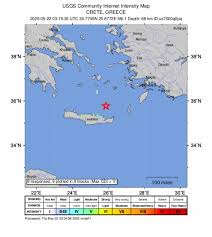Strong Earthquake Strikes Crete, Causing Damage and Alarm

Introduction
On the evening of 19th October 2023, a powerful earthquake measuring 6.1 on the Richter scale struck the island of Crete, Greece. This seismic event has garnered significant attention due to its potential impact on both local residents and the thriving tourism sector, which is crucial for the island’s economy.
Details of the Earthquake
The earthquake occurred at approximately 8:47 PM local time, with its epicentre located around 60 kilometres south of the city of Heraklion, a popular destination known for its rich history and vibrant culture. Initial reports indicated that the quake was felt strongly across the island, including in the capital, and as far away as mainland Greece.
The tremor lasted for several seconds, making it one of the largest seismic events to affect the region in recent years. No tsunami warning was issued, but local authorities quickly mobilised to assess damage and ensure the safety of residents and tourists.
Impact and Response
Preliminary assessments revealed damage to several buildings and infrastructure in various towns, with reports of fallen debris and minor injuries among the population. Emergency services were deployed promptly, and a state of readiness was declared to provide support and assistance wherever necessary. Crete’s hospitals reported an influx of patients with minor injuries, primarily due to panic and falling objects during the quake.
The earthquake raised concerns among tourists currently visiting the island. Local tourism boards assured visitors that the region is safe and that measures are being taken to ensure their wellbeing. Popular tourist attractions resumed normal operations shortly after the quake, with officials urging visitors to remain calm.
Looking Ahead
In the wake of the earthquake, seismologists are closely monitoring activities in the area to determine any aftershocks or related tectonic movements. The Greek government is conducting comprehensive evaluations of the structural integrity of various buildings, particularly those deemed vulnerable due to their age or construction materials.
Conclusion
The recent earthquake in Crete serves as a stark reminder of the region’s seismic activity, prompting discussions about preparedness and resilience against natural disasters. As assessments continue and recovery efforts unfold, both the local population and tourists are advised to stay informed through official channels. This incident not only highlights the need for improved earthquake preparedness but also reinforces the importance of community solidarity in times of crisis.








